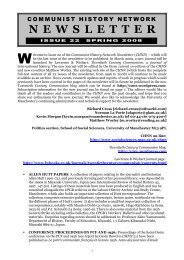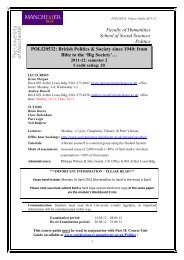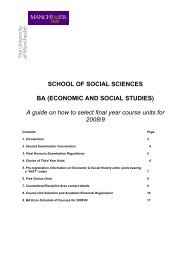RESUME OF NIGER SULTANA - School of Social Sciences
RESUME OF NIGER SULTANA - School of Social Sciences
RESUME OF NIGER SULTANA - School of Social Sciences
Create successful ePaper yourself
Turn your PDF publications into a flip-book with our unique Google optimized e-Paper software.
Contact<br />
Home:<br />
22, Devonshire Street South,<br />
Ardwick, Manchester,<br />
M13 9HA, UK<br />
Phone: 0161 2727307<br />
Mobile: 07501933289<br />
Rabeya Khatoon<br />
Curriculum Vitae, December 2012<br />
1<br />
University:<br />
<strong>School</strong> <strong>of</strong> <strong>Social</strong> <strong>Sciences</strong>,<br />
University <strong>of</strong> Manchester,<br />
3 rd Floor Arthur Lewis Building,<br />
Oxford Road, Manchester<br />
M13 9PL, UK<br />
E-mail: Rabeya.Khatoon@postgrad.manchester.ac.uk, rabeya005@yahoo.com<br />
Personal Details<br />
Citizenship: Bangladesh<br />
Date <strong>of</strong> Birth: 27 December 1981<br />
Education<br />
2009-2013<br />
PhD Candidate in Economics (Expected Submission Date: February 2013)<br />
University <strong>of</strong> Manchester, Manchester, UK<br />
Thesis Title: Estimation and Inference <strong>of</strong> Microeconometric Models based<br />
on Moment Condition Models<br />
Thesis Supervisors: Pr<strong>of</strong>essor Alastair Hall (main), Pr<strong>of</strong>essor Martyn<br />
Andrews.<br />
2008-2009 MSc in Economics & Econometrics (Distinction)<br />
University <strong>of</strong> Manchester, Manchester, UK<br />
2002-2003 Master <strong>of</strong> <strong>Social</strong> Science in Economics (1 st class 1 st Position), Degree<br />
awarded in 2006<br />
University <strong>of</strong> Dhaka, Dhaka, Bangladesh<br />
1998-2002 Bachelor <strong>of</strong> <strong>Social</strong> Science in Economics (1 st class 1 st Position), Degree<br />
awarded in 2004, University <strong>of</strong> Dhaka, Dhaka, Bangladesh<br />
Employment<br />
2007-2008<br />
2006-2007<br />
Lecturer, Department <strong>of</strong> Economics, University <strong>of</strong> Dhaka,<br />
Bangladesh (on study leave)<br />
Research Associate, UNDP and EU funded projects under Dr.<br />
Abdur Razzaque and Dr. Selim Raihan, Dhaka, Bangladesh
Research Interests<br />
Theoretical and applied microeconometrics, Generalized Method <strong>of</strong> Moments and<br />
Generalized Empirical Likelihood estimation, Grouped data models, labour economics,<br />
macroeconometric modelling, international trade<br />
Publications<br />
Why Do Men Earn More Than Women? An Analysis Using British Household Panel<br />
Survey, with Mohammad Mahbubur Rahman, The Bangladesh Development Studies,<br />
Vol. 35, No. 1, March 2012. http://www.bids.org.bd/bds/35-1/Rahman&Khatoon.pdf<br />
Assessing the existence <strong>of</strong> J-curve effect in Bangladesh, with Mohammad Mahbubur<br />
Rahman, The Bangladesh Development Studies, Vol. 32, No. 2, June 2009.<br />
http://www.bids.org.bd/bds/32-2/BDS_32_2%20Khatoon%20&%20Rahman.pdf<br />
Share <strong>of</strong> Children in Annual Development Program: A Case with Bangladesh, with<br />
M.M. Akash and Iftekher Hossain, Pakistan Journal <strong>of</strong> <strong>Social</strong> Science, Vol.3, No.2,<br />
2005.<br />
Under Review<br />
A Small Macroeconometric Model <strong>of</strong> the Bangladesh Economy, Mohammad Mahbubur<br />
Rahman, Journal <strong>of</strong> Policy Modelling, September 2012 (2 nd revision, 3 rd submission).<br />
Monetary Policy Impacts in Bangladesh: A Macroeconometric Model Approach, with<br />
Mohammad Mahbubur Rahman, The Bangladesh Development Studies, June 2012 (1 st<br />
submission).<br />
Re-assessing the Relationship among Stock Returns, Term Structure, Inflation and Real<br />
Activity, with Mohammad Mahbubur Rahman, The Bangladesh Development Studies,<br />
June 2012 (1 st submission).<br />
Book Chapters<br />
WTO Negotiations on the Non-agricultural Market Access (NAMA): Implications for the<br />
Bangladesh Economy (Chapter 5), with Selim Raihan and Abdur Razzaque, in WTO and<br />
Regional Trade Negotiations Outcome: Quantitative Assessments <strong>of</strong> Potential<br />
Implications on Bangladesh, edited by Selim Raihan and Abdur Razzaque, Pathak<br />
Samabesh, Dhaka, Bangladesh, 2007.<br />
2
WTO’s “Aid for Trade”: Issues and Concerns (Chapter 8), with Selim Raihan, in WTO<br />
and Regional Trade Negotiations Outcome: Quantitative Assessments <strong>of</strong> Potential<br />
Implications on Bangladesh, edited by Selim Raihan and Abdur Razzaque, Pathak<br />
Samabesh, Dhaka, Bangladesh, 2007.<br />
Market Access Problems <strong>of</strong> Bangladesh’s Export Products: A Study on Some Selected<br />
Sub-Sectors (Chapter 10), with Abu Eusuf, Mahbub Alam and Mokammel K. T., in WTO<br />
and Regional Trade Negotiations Outcome: Quantitative Assessments <strong>of</strong> Potential<br />
Implications on Bangladesh, edited by Selim Raihan and Abdur Razzaque, Pathak<br />
Samabesh, Dhaka, Bangladesh, 2007.<br />
Non-Traditional Exports: A Brief Review <strong>of</strong> Some Selected Sector-Specific and General<br />
Constraints (Chapter 5), with Abu Eusuf, Mahbub Alam, Mokammel K. T., in Trade and<br />
Industrial Policy Environment in Bangladesh with Especial emphasis on Some Nontraditional<br />
Export Sectors, edited by Abdur Razzaque and Selim Raihan, Pathak<br />
Samabesh, Dhaka, Bangladesh, 2007.<br />
Working Papers<br />
Modelling Gender Impacts <strong>of</strong> Policy Reforms in Bangladesh: A Study in a Sequential<br />
Dynamic CGE Framework, with Selim Raihan, M. Jami Husain and Suriya Rahman,<br />
MPIA Working Paper 2010-19.<br />
http://papers.ssrn.com/sol3/papers.cfm?abstract_id=1698084<br />
Pr<strong>of</strong>essional Experience<br />
Teaching in Undergraduate Courses<br />
2010-2011 Microeconomics IIA, IIB (Year 2) (University <strong>of</strong> Manchester as<br />
Graduate Teaching Assistant)<br />
2007-2008 Statistical Methods I, II (Year 1), Mathematical Economics (Year 3)<br />
(University <strong>of</strong> Dhaka, Bangladesh)<br />
2008-2009 Statistical Methods I (Year 1), Mathematical Economics (Year 3)<br />
(University <strong>of</strong> Dhaka, Bangladesh<br />
Administrative Experience<br />
2010 Exam Invigilation, Mid Term Test, ECON20351 Microeconomics IIA<br />
(Year 2)<br />
2007 Member, B.S.S. Year 3 Examination Committee, Department <strong>of</strong><br />
3
Economics, University <strong>of</strong> Dhaka, Bangladesh.<br />
Consultancy Works<br />
2008 Local Consultant in the Bangladesh Trade Support Program- Study VII,<br />
Better Protection for Geographical Indications for all Products: GI<br />
Extension, Ministry <strong>of</strong> Commerce, Government <strong>of</strong> the Peoples’ Republic<br />
<strong>of</strong> Bangladesh (May-August 2008).<br />
2007-2008 Project Leader, The implications <strong>of</strong> Current Monetary Policy in<br />
Bangladesh- A Macroeconometric Model Approach, sponsored by<br />
Bureau <strong>of</strong> Economic Research, University <strong>of</strong> Dhaka, Bangladesh<br />
(December 2007 to September 2008).<br />
2007 Gender Specialist and Quantitative Research Associate, Impact Study on<br />
Sustainable Improvement <strong>of</strong> Hygiene Behaviour and Health Situation<br />
Relating to Water and Environmental Sanitation <strong>of</strong> ASEH Programme,<br />
Water Aid Bangladesh, (July-September 2007).<br />
Academic Presentations<br />
2012 Manchester Doctoral Conference, Economics, University <strong>of</strong> Manchester.<br />
First Order and Second Order Asymptotic Analysis <strong>of</strong> GEL Estimators<br />
for Grouped Data Model.<br />
2011 Manchester Doctoral Conference, Economics, University <strong>of</strong> Manchester.<br />
Estimation and Inference in Grouped Data Models.<br />
2009 EcoMod International Conference on Policy Modeling, Ottawa, Canada.<br />
Monetary Policy Impacts in Bangladesh: A Macroeconometric Model<br />
Approach.<br />
2006 9 th GTAP and 5 th PEP conferences, Addis Ababa, Ethiopia. Modeling<br />
Gender Impacts <strong>of</strong> Policy Reforms in Bangladesh: A Study in a<br />
Sequential Dynamic CGE Framework.<br />
2004 First Conference <strong>of</strong> South Asian Students <strong>of</strong> Economics, Delhi, India.<br />
Infrastructure in Bangladesh.<br />
Awards<br />
2009-2012<br />
Economics Discipline Area Award, Department <strong>of</strong> Economics, <strong>School</strong> <strong>of</strong><br />
<strong>Social</strong> <strong>Sciences</strong>, University <strong>of</strong> Manchester, UK.<br />
Overseas Research Scholarship Award, <strong>School</strong> <strong>of</strong> <strong>Social</strong> <strong>Sciences</strong>,<br />
4
University <strong>of</strong> Manchester, UK.<br />
2009 Allman Prize, Manchester Statistical Society.<br />
2008 Commonwealth Masters Scholarship.<br />
2005 Prime Ministers Gold Medal, Bangladesh.<br />
2002 M.N. Huda Gold Medal, University <strong>of</strong> Dhaka, Bangladesh.<br />
1998 Rowshan Ershad Gold Medal, Dhaka, Bangladesh.<br />
1996-2002 Board <strong>of</strong> Higher Secondary and Secondary Studies Awards, Dhaka,<br />
Bangladesh.<br />
Computer Skills<br />
Language Skills<br />
Bengali<br />
Matlab, Stata, Eviews, Gauss, Micr<strong>of</strong>it, LATEX, MS Office<br />
Native<br />
English Fluent<br />
References<br />
(a) Alastair Hall (Main PhD supervisor)<br />
Pr<strong>of</strong>essor in Econometrics,<br />
Department <strong>of</strong> Economics, University<br />
<strong>of</strong> Manchester.<br />
Room Number: 3.068 [Arthur Lewis<br />
Building]<br />
Tel: +44(0)161 275 4875<br />
Fax: +44(0)161 275 4812<br />
Email: alastair.hall@manchester.ac.uk<br />
(c) Dr Abdur Razzaque<br />
Economic Adviser, International<br />
Trade and Regional Cooperation<br />
Section, Economic Affairs Division,<br />
Commonwealth Secretariat,<br />
London, UK<br />
Tel: +44 207 747 6273, E-mail:<br />
m.razzaque@commonwealth.int<br />
(b) Martyn Andrews (Second PhD Supervisor)<br />
Pr<strong>of</strong>essor <strong>of</strong> Applied Econometrics,<br />
Department <strong>of</strong> Economics, University <strong>of</strong><br />
Manchester.<br />
Room Number: 3.017 [Arthur Lewis<br />
Building]<br />
Tel: +44(0)161 275 4874<br />
Email: martyn.andrews@manchester.ac.uk<br />
5
Thesis Abstract (preliminary)<br />
The existing estimation techniques for grouped data models can be analyzed as a class <strong>of</strong><br />
estimators <strong>of</strong> Instrumental Variable - Generalized Method <strong>of</strong> Moments (IV-GMM) type<br />
with matrix <strong>of</strong> group indicators being the set <strong>of</strong> instruments. Econometric literature (e.g.<br />
Smith 1997, Newey and Smith 2004) show that in some cases <strong>of</strong> empirical relevance,<br />
GMM can have shortcomings in terms <strong>of</strong> the large sample behaviour <strong>of</strong> the estimator<br />
being different from the finite sample properties. Generalized Empirical Likelihood<br />
(GEL) estimators are developed that are not sensitive to the nature and number <strong>of</strong><br />
instruments and possess improved finite sample properties compared to GMM estimators.<br />
GEL as a class <strong>of</strong> estimators include Empirical Likelihood (EL), Exponential Tilting (ET)<br />
and Continuous Updating Estimator (CUE). In this paper, with the assumption that the<br />
data vector is iid within group, but inid across groups, we developed GEL estimators for<br />
grouped data model having population moment conditions <strong>of</strong> zero mean <strong>of</strong> errors in each<br />
group. First order asymptotic analysis <strong>of</strong> the estimators show that they are consistent<br />
and normally distributed. The paper explores second order bias properties that<br />
demonstrate sources <strong>of</strong> bias and differences between choices <strong>of</strong> GEL estimators.<br />
Specifically, the second order bias depends on the third moments <strong>of</strong> the group errors and<br />
correlation among the group errors and explanatory variables. With symmetric errors and<br />
no endogeneity all three estimators EL, ET and CUE yield unbiased estimators.<br />
Simulation exercise supports the comparative efficiency <strong>of</strong> EL and bias-corrected EL<br />
estimators to IV-GMM estimators. There remains some additional works in progress.<br />
These include, simulation for ET, CUE, design for model specification tests and results<br />
using efficient bootstrap with EL estimated probabilities. As a part <strong>of</strong> the analysis, the<br />
consequences <strong>of</strong> data being dependent within group (e.g., if we have panel data) while<br />
estimated assuming iid structure will also be included. An empirical investigation on<br />
estimating the returns to schooling using UK Labour Force Survey data is in progress.<br />
6

















